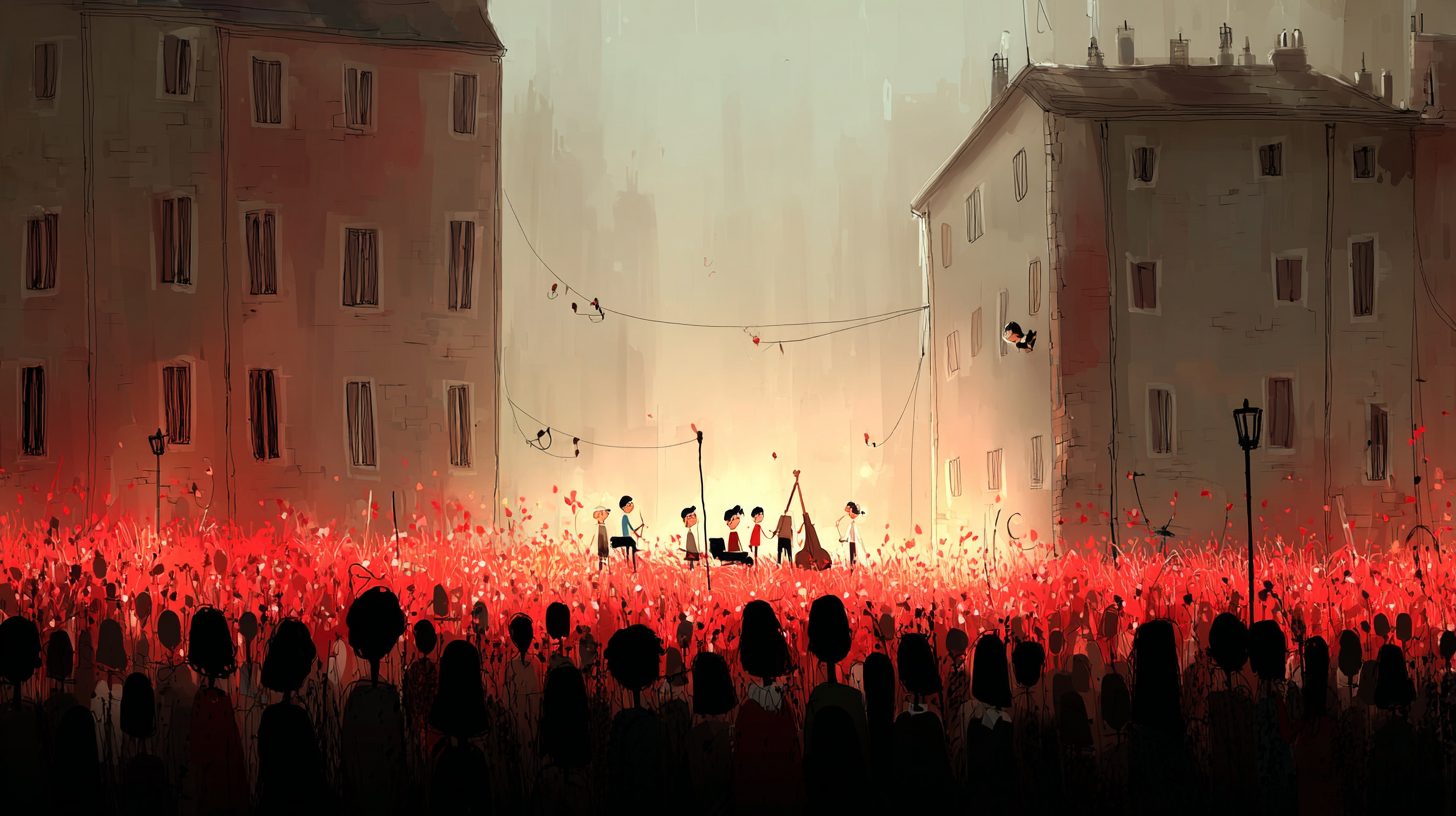“Crowd” means “a large group of people together.”
「crowd」は「たくさんの人が集まっていること」を意味する。
以下は英単語 “crowd” に関するストーリー型学習コンテンツです。まずは大枠の意味を理解して最後の文章で確認しましょう。
主な意味(main meaning)
| 品詞 | 意味 | 発音記号 (IPA) | 例文 |
|---|---|---|---|
| 名詞 | 人々の集まり、群衆 | /kraʊd/ | A large crowd gathered in front of the station. |
| 動詞 | 詰めかける、押し寄せる | /kraʊd/ | Fans crowded around the singer after the concert. |
語源(etymology)
「crowd」は古ノルド語「kroda(押す、押し合う)」に由来し、「たくさんの人や物がぎゅうぎゅうに集まるイメージ」を持つ。
類義語(synonyms)
| 類義語 | 意味 | 例文 |
|---|---|---|
| group | 集団 | A group of students visited the museum. |
| gathering | 集まり | There was a small gathering at her house. |
| audience | 観客 | The audience clapped loudly at the end of the play. |
| throng | 群衆 | A throng of people filled the shopping street. |
反義語(antonyms)
| 反義語 | 意味 | 例文 |
|---|---|---|
| individual | 個人 | Every individual has the right to speak freely. |
| solitude | 孤独 | He enjoyed the peace of solitude in the forest. |
コロケーション(collocations)
| コロケーション | 例文 |
|---|---|
| large crowd | A large crowd waited for the parade. |
| control the crowd | The police tried to control the crowd. |
| crowd of people | A crowd of people stood outside the store. |
| attract a crowd | The street performer attracted a crowd. |
| crowd behavior | Researchers study crowd behavior during events. |
2項表現(binomials)
| 2項表現 | 例文 |
|---|---|
| safe and sound | The children returned safe and sound from the trip. |
| here and there | There were flowers here and there in the park. |
英語ストーリー(english story)
The Unexpected Speech
It was a sunny Saturday afternoon in the city. A large crowd had gathered in the main square because a famous author was scheduled to give a public talk. People of all ages were waiting eagerly, chatting with each other and taking pictures. The crowd of people was so big that it almost blocked the entrance to the nearby shopping mall.
Tom, a university student, stood near the back. He usually disliked being in a crowd because he preferred solitude, but today he wanted to hear the author’s message. “I don’t usually join such a gathering, but this one is special,” he thought.
Suddenly, a street performer started playing the guitar. His lively music quickly attracted a crowd, and many people turned their attention to him. The audience clapped and smiled, enjoying the unexpected show. Tom noticed how quickly a group of strangers became connected through the music. He thought about how fascinating crowd behavior could be.
When the author finally arrived, the security guards tried to control the crowd so that everyone could listen. The famous writer spoke about the importance of books in bringing people together. “Books,” he said, “are like bridges. They connect individuals and help us share ideas.” The audience was deeply moved.
Tom looked around. He saw a throng of people listening silently, united by the author’s words. For a moment, he felt that even in a big crowd, he could feel safe and sound if people were respectful and kind.
After the talk ended, Tom stayed for a while. The audience slowly left the square, walking here and there. Tom realized that while he loved quiet moments alone, sometimes being part of a crowd gave him a sense of belonging. He whispered to himself, “Today, I learned something new. A crowd is not just noise. It can also be harmony.”
和訳
思いがけないスピーチ
ある晴れた土曜日の午後。街の広場には**large crowd(大きな人だかり)が集まっていた。有名な作家が公開トークを行う予定だったのだ。老若男女が集まり、わくわくした様子でおしゃべりをしたり写真を撮ったりしていた。そのcrowd of people(人の群れ)**はとても大きく、近くのショッピングモールの入口をふさいでしまうほどだった。
大学生のトムは後ろの方に立っていた。彼は普段**crowd(人ごみ)**が苦手で、**solitude(ひとりの時間、孤独)を好んでいたが、この日は作家の話を聞きたかった。「普段はこんなgathering(集まり)**には参加しないけど、今日は特別だ」と彼は思った。
すると突然、ストリートパフォーマーがギターを弾き始めた。その元気な音楽はすぐにattracted a crowd(人だかりを引き寄せ)、多くの人がそちらに注目した。観客(audience)は手を叩き、笑顔で予期せぬショーを楽しんでいた。トムは見知らぬ人々が音楽を通してあっという間にひとつになっていくのを見て、**crowd behavior(群衆のふるまい)**の面白さを感じた。
やがて作家が到着すると、警備員が**control the crowd(群衆を整理)**しようとした。作家は「本は人々をつなげる大切なものです。本は橋のように、**individuals(個人)**を結びつけ、アイデアを共有させてくれます」と語った。観客は深く感動した。
トムは辺りを見回した。そこには静かに耳を傾ける**throng(群衆)がいた。彼は思った。「人々が礼儀正しく親切であれば、大きなcrowd(人だかり)の中でもsafe and sound(無事で安心)**でいられるんだ。」
講演が終わると、観客(audience)はゆっくりと広場を後にし、あちこち(here and there)へ歩いて行った。トムは気づいた。静かなひとりの時間も好きだが、時には**crowd(群衆)**の一員になることが、帰属意識を与えてくれると。彼は小さくつぶやいた。「今日は新しいことを学んだ。人ごみはただの騒音じゃない。調和にもなり得るんだ。」
Q&A
Q: 「crowd」と「group」の違いは?
A: 「crowd」はたくさんの人がごちゃごちゃと集まっているイメージで、まとまりがなくてもよいです。「group」は小さめの人数で、目的やまとまりがある集団を指します。
Q: 「crowd」と「gathering」の違いは?
A: 「crowd」は自然に人が集まった状態を表します。「gathering」は計画されて開かれる集まり(例えばパーティーや会議)を指すことが多いです。
Q: 「crowd」と「audience」の違いは?
A: 「crowd」はただ人が集まっている状態を広く表します。「audience」は劇、コンサート、スピーチなどを見たり聞いたりする観客に限定されます。
Q: 「crowd」と「throng」の違いは?
A: 両方とも「人ごみ」ですが、「throng」は特にぎゅうぎゅう詰めで動けないほどの大群衆を強調するときに使われます。
Q: 「large crowd」と「crowd of people」はどう違う?
A: どちらも「大勢の人々」という意味ですが、「large crowd」は人数の多さに焦点があります。「crowd of people」は「人々が集まっている」という状態を強調しています。
Q: 「control the crowd」と「crowd behavior」の違いは?
A: 「control the crowd」は警備員や警察などが「群衆を整理する」という具体的な行動を表します。「crowd behavior」は心理学や社会学的に「人々が群衆の中でどう振る舞うか」という行動傾向を指します。
Q: 「attract a crowd」と「large crowd」の違いは?
A: 「attract a crowd」は「人を集める」という動作を表します。「large crowd」は「大勢の人がすでにいる」という状態を表します。



コメント